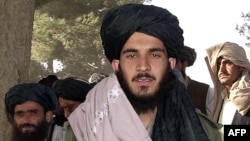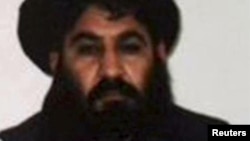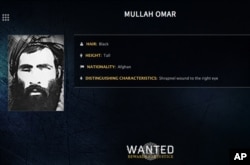The head of the Afghan Taliban’s political office in Qatar has resigned, and issued a highly critical statement that highlights growing internal schisms since last week’s confirmation of the death of founder Mullah Mohammad Omar.
In a statement released to the media, Tayyab Agha said there were “historic mistakes” made in keeping Mullah Omar’s death secret for nearly two years and in picking his successors outside of Afghanistan.
Agha’s claim gives credence to the widespread perception that the Taliban’s new leader, Mullah Akhtar Mansoor, was selected with the backing of Pakistan.
The statement also suggests that the group’s senior political representative was unaware of the Taliban leader’s death and had been actively deceived by those around Omar since he died two years ago.
Sought guidance
Agha claimed that he repeatedly demanded to be sent guidance via audio recordings from Mullah Omar in recent times, but was told there was “no need.”
On Monday, the Taliban’s media wing released a video showing hundreds of members pledging allegiance to Mansoor. However, the deceased leader’s family and some top Taliban commanders are insisting they have not endorsed him.
Agha, believed to be a close confidant of the deceased Taliban leader, said he will not be part of any future decisions and has ceased all meetings with Afghan or foreign delegations.
He said the new Taliban leader “should have been elected from the Taliban fighters and in the bunkers.”
Under Agha, the Taliban’s Doha office had distanced itself from the first round of peace talks July 7 between the Islamist group and Afghan officials, a meeting brokered and hosted by Pakistan.
Both Afghan and Pakistani officials have acknowledged that the Taliban delegation came to the table with the approval of Mansoor, who was serving as Omar’s deputy in addition to being the head of Taliban’s political and military affairs.
Pakistan maintains that it is acting merely as a "facilitator" of the talks between the warring sides at the request of the Afghan government and its international allies.
On Tuesday, a Pakistan military statement quoted its chief General Raheel Sharif as underscoring the "ongoing peace talks" between the Afghan government and the Taliban are "the only credible way to achieve lasting peace." The army chief went on to say that "detractors and spoilers are against peace and prosperity of Afghanistan and the region."
Death confirmed
The Afghan government disclosed the news of Mullah Omar's death a day before its envoys were due to travel to Pakistan for a second round of peace talks with Taliban officials.
The Taliban quickly moved to confirm the death of its founding leader but did not say where and when it happened.
The group insisted that Omar never left Afghanistan since the U.S.-led invasion of the country began in late 2001 and never visited Pakistan.\
Agha’s statement Tuesday is the first official word from a senior Taliban official indicating that Omar did indeed die two years ago, and that someone else has been posing as the Taliban leader since then.
The Taliban’s main spokesman, Zabiullah Mujahid, has not commented on Agha’s resignation or his allegations about an apparent cover-up of Mullah Omar’s death.
In a statement released to reporters Tuesday, spokesman Mujahid also denounced as “enemy propaganda” reports of divisions in the Taliban. He added that all Taliban groups, prominent Afghan clerics and elders across Afghanistan have pledged allegiance to Mansoor.
The spokesman also condemned the Afghan government for banning displays of public mourning for Mullah Omar’s death.
Afghan officials insisted such gatherings would cause “anguish and humiliation” to the thousands of people fallen victims to the Taliban’s violent campaign.
Peace talks
Leaders in Afghanistan and Pakistan appear upbeat about an early resumption of the Afghan peace process despite internal Taliban rifts.
However, critics say a lot will depend on whether Taliban leader Mansoor can win legitimacy.
Former Taliban Foreign Minister Wakil Ahmad Mutawikil told VOA he does not foresee a resumption of a sustainable, result-oriented Afghan peace process anytime soon.
He said the Taliban needs to address the apparent opposition of some members to the new leadership. He also said both sides need to clearly state their resolve and intentions for negotiating peace.
However, Mutawakil said the primary objection to the election of Mansoor has been that the meeting that chose him was not fully representative
He said it is not possible for the Taliban to hold a large, representative meeting under the current wartime circumstances.
Mutawakil also insisted that a durable peace can come to Afghanistan only through an intra-Afghan dialogue without any foreign support and without presence of foreign forces in the country.







